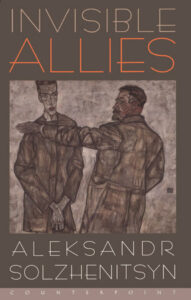Aleksandr Solzhenitsyn
Aleksandr Solzhenitsyn was born on December 11, 1918 in Kislovodsk in the northern Caucusus Mountains. He received a degree in physics and math from Rostov University in 1941. He served in the Russian army during World War II but was arrested in 1945 for writing a letter criticizing Stalin. He spent the next decade in prisons and labor camps and, later, exile, before being allowed to return to central Russia, where he worked as a high school science teacher. His first novel, One Day in the Life of Ivan Denisovich, was published in 1962. In 1970, he was awarded the Nobel Prize for Literature. In 1974, he was arrested for treason and exiled following the publication of The Gulag Archipelago. He moved to Switzerland and later the U. S. where he continued to write fiction and history.
Books
Invisible Allies
After his expulsion from Russia, Aleksandr Solzhenitsyn secretly worked on a memoir that would acknowledge the courageous efforts of the people who hid his writings and smuggled them to the West. Before the fall of Communism, the very publication of Invisible Allies would have put these friends in jeopardy.Now we are finally granted an intimate account of the extensive, ever-shifting network of individuals who risked life and liberty to ensure that Solzhenitsyn's works were kept safe, circulated in samizdat, and "exported" via illicit channels. These imperiled conspirators, often unknown to one another, shared a devotion to the dissident writer's work and a hatred of the regime that brought terror to every part of their lives. The circle included scholars and fellow writers and artists, but also such unlikely operatives as an elderly babushka who picked up and delivered manuscripts in her shopping bag.
With tenderness, respect, and humor, Solzhenitsyn tells us of the fates of these partners in intrigue: the women who typed distribution copies of his works late into the night under the noses of prying neighbors; the correspondents and diplomats who covertly carried the microfilmed texts across borders; the farflung friends who hid various drafts of Solzhenitsyn's works anywhere they could--under an apple tree, beneath the bathtub, in a mathematics professor's loft with her canoe. In this group of deftly drawn portraits, Solzhenitsyn pays tribute to the anonymous heroes who evaded the KGB to bring The Gulag Archipelago and his many other works to the world.
Apricot Jam
And Other Stories
After years of living in exile, Aleksandr Solzhenitsyn returned to Russia in 1994 and published a series of eight powerfully paired stories. These groundbreaking stories— interconnected and juxtaposed using an experimental method Solzhenitsyn referred to as "binary"—join Solzhenitsyn's already available work as some of the most powerful literature of the twentieth century.With Soviet and post–Soviet life as their focus, they weave and shift inside their shared setting, illuminating the Russian experience under the Soviet regime. In "The Upcoming Generation," a professor promotes a dull but proletarian student purely out of good will. Years later, the same professor finds himself arrested and, in a striking twist of fate, his student becomes his interrogator. In "Nastenka," two young women with the same name lead routine, ordered lives—until the Revolution exacts radical change on them both.
The most eloquent and acclaimed opponent of government oppression, Solzhenitsyn was awarded the Nobel Prize in Literature in 1970, and his work continues to receive international acclaim. Available for the first time in English, Apricot Jam: And Other Stories is a striking example of Solzhenitsyn's singular style and only further solidifies his place as a true literary giant/

Catapult | Counterpoint | Soft Skull
20 Jay Street #704
Brooklyn, NY 11201
646.926.0805 | contact@catapult.co






